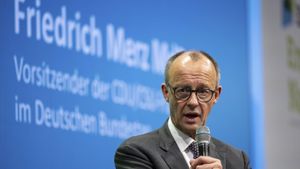Rachel Reeves has backed the third runway at London's Heathrow Airport as part of a fresh plan to get the UK's sluggish economy growing. Speaking to business leaders, the Chancellor outlined how the Heathrow expansion—delayed for decades due to environmental concerns—would "make Britain the world's best connected place to do business," she remarked on BBC.
Reeves also extended her support for expansions at Luton and Gatwick airports, as well as proposing a "growth corridor" between Oxford and Cambridge, casting this area as potentially "Europe's Silicon Valley." The plans gained traction among Conservative leaders, with Kemi Badenoch asserting the proposals had been largely borrowed from her party's agenda. Alarmingly, she cautioned, any growth prospects might be "destroyed" by the government's Employment Rights Bill, increasing burdens on businesses.
During her Oxford speech, Reeves sought to instill optimism as the economy faces stagnancy. Responding to Conservative claims linking her "job-destroying" budget to the slowdown, she defended her decision to raise employers' National Insurance, asserting the necessity of restoring economic stability. While she hesitated to exclude the possibility of additional tax hikes, she emphasized efforts to turn the economy around quickly.
Describing the UK as having "huge potential" stifled by timid politics, she stated, "Low growth is not our destiny, but growth will not come without a fight, without a government willing to take the right decisions now to change our country's future for the best." Given the government's focus on economic growth—essential for improving public services and living standards, as well as for electoral success—new aviation technologies are claimed to allow for the expansion to fall within carbon reduction regulations. Nevertheless, environmental activists and Labour's Mayor of London, Sadiq Khan, continue to resist these developments.
Reeves expressed her desire for the planning application for the third runway to be approved before the next election, due by 2029, adding urgency to the initiative. She proposed expedited phases for the East-West rail project, aimed at connecting Oxford directly to Cambridge through Milton Keynes and Bedford. “I want spades in the ground. I want people to see things happening,” she proclaimed on BBC, indicating her commitment to seeing tangible growth.
Earlier, she highlighted the potential economic boost from the new Oxford-Cambridge corridor, predicting it could inject up to £78 billion by 2035 through improved water infrastructure and investments in high-tech sectors. The announcement was met with positive responses from trade unions and the airport's chief executive, Thomas Woldbye, who praised it as "the bold, responsible vision the UK needs to thrive."
Conversely, Khan doubted the credibility of airport expansions, asserting, "I'm simply not convinced... without a hugely damaging impact on our environment." Reeves criticized the pace of the planning system, expressing frustration over delays attributed to environmental assessments, and insisted developers must no longer be preoccupied with "the bats and the newts"—a quip about environmental concerns hindering progress.
With the Planning and Infrastructure Bill anticipated to streamline approvals for infrastructure projects, Reeves alongside Sir Keir Starmer proposed eliminating excessive regulations slowing foreign investment. The government is opting to relax restrictions on major pension funds, aiming to spur more domestic investment.
During Prime Minister’s Questions, Badenoch illustrated disparities between government strategies, particularly the impact of the Employment Rights Bill on businesses. She argued extending statutory sick pay will exacerbate business expenses, potentially triggering higher consumer costs and triggering unemployment.
Against this backdrop, Labour appears to be grappling with economic challenges as recent announcements from companies like Sainsbury’s and Lloyds Banking Group foreshadow significant job cuts—a stark reminder of the broader economic climate. Amidst these pressures, some Labour members advocate support for Reeves’ plans to improve infrastructure in housing and job creation as part of the Oxford-Cambridge corridor development.
With investment commitments to improve rail links, housing affordability, and new infrastructure around Cambridge identified as national topics of concern, local MPs, including Sam Carling and Andrew Pakes, expressed gratitude for the support for their regions. Carling stated, "Investment will strengthen connectivity across Cambridgeshire, Peterborough and beyond," emphasizing the community’s need for progress and development aligned with growth initiatives.
Pakes noted significant economic potential exists within Peterborough, projecting improved skill levels and job creation tied to the Oxford-Cambridge expansion, emphasizing the necessity for immediate action. The MPs attended the "Driving Growth for the UK: The Pivotal Role of Cambridgeshire and Peterborough" reception to share insights and forge new partnerships toward amplified regional economic support.
While Reeves remains committed to advancing the aviation development agenda, challenges loom on the horizon, including potential pockets of resistance from environmental advocates and critics who remain cautious about the sustainability of expanded aviation versus economic growth. All eyes will be on how the government navigates these turbulent waters as it strives to chart the course for the future of UK aviation and broader economic revitalization.



